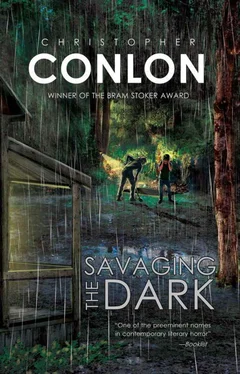He comes the next day, fresh-faced and on time, his cheeks bright apple-red in the cold. Gracie is playing with a picture puzzle on the floor. Bill is at work. I watch my young student walk briskly up our front walk in his brown coat and red wool hat, ring the doorbell.
“Is that the boy?” Gracie asks. I’ve told her he’s coming.
“Yes, sweetheart, I think it is.” I run my hands over my hair nervously, smooth my blouse, go to the door and open it.
“Hi, Ms. Straw!”
“Connor. You came.”
“Sure! I like money.”
I smile. “I’ll bet you do.” My fingers flutter around my face, my hair. “Come in, Connor. Meet my daughter, Gracie. Gracie, this is Connor. He’s one of my students.”
“’lo.” She glances up, then back down at her puzzle. Gracie doesn’t care for strangers.
“Hi, Gracie!” Connor steps quickly over to her and kneels down. “Hey, you like puzzles, huh?”
She shrugs. “Sorta.”
Connor studies it for a moment, picks up a loose piece and points out where it belongs. He hands it to Gracie to put in, and she smiles a little. He stands again, faces me.
“Well,” I say, “are you ready?”
“Sure!” He looks around. “You have a nice house, Ms. Straw.”
“Thank you, Connor. Step into the living room here. That leads to the back.”
We do. Connor’s eyes look around admiringly at the big-screen TV and big collection of videocassettes on the shelves. “Wow, Ms. Straw, you must have a hundred movies here!” He tilts his head sideways to look at the titles.
“You’re welcome to borrow any that you want, Connor.”
“Yeah, but you know what?” He looks at me sadly. “Our VCR’s busted.”
“Oh, no. Can you get it fixed?”
He shrugs. “My dad keeps saying he’ll get around to it. It hasn’t worked in a week.”
“I’m sorry, Connor.” I look at him. “Listen, the job’s in back here.” We step onto the rear porch. “See the shed there? There’s a walkway to it, but you can’t really see it in the snow. It’s just sort of an indentation. See?” I point.
“Yeah, I see.” He notices the snow shovel leaning against the house and grabs it in his mitten-wrapped hands. “I’ll have it done in no time!”
I smile. “This is a big help, Connor. Thank you.”
“Sure!” He grins brightly under his red wool cap, takes the shovel and marches over to the start of the walkway. I watch his shoulders as he works. He’s energetic, stronger than I might have thought. He’s very tidy, making sure each portion of the walkway is completely cleared before moving onto the next. I realize I should stop staring at him and turn away, look at Gracie who has come into the living room and is watching him too.
I have a vision, a sudden image in my mind, Bill and I, Gracie, we’re together in this house and we’re happy and normal and there’s a fire in the fireplace and a holiday movie on the TV and hot chocolate with marshmallows in mugs on the table and Connor, if he’s there at all, Connor is simply a neighborhood boy, my student whom I’ve hired partly out of practicality, partly out of sympathy, he shovels the walk in my vision and comes in and I pay him his money and he thanks me and out he heads into the fading winter afternoon, happy as a lark at his newfound wealth, running off to join Douglas or some other boy and frolic in the snow exactly as any sweet trusting eleven-year-old boy should. Yes. For an instant this is vivid in my mind, as bright and detailed as any vision can possibly be. And as evanescent. As unreal.
The lunchtime sessions become movie-watching sessions. I have a VCR and TV combination unit permanently in my classroom, after all. Connor’s father is seemingly in no hurry to repair the equipment at home. And so I suggest to him that he can watch movies here at the noon hour. “You’ll have to break a movie into two parts, probably, the lunch period isn’t long enough,” I say. “But you’re welcome to use the equipment here.”
“Wow! Thanks, Ms. Straw!”
He does. And watching Strangers on a Train, Foreign Correspondent, Key Largo, Public Enemy proves to be even more enticing than sledding with Douglas Peterson. The snow melts rapidly enough, anyway, soon nothing more than gray and white splotches on the landscape. For a while I fear that Connor may suggest that Douglas or some other boy come watch the films too, but this doesn’t happen. I wonder why not. Maybe Connor simply knows that other boys his age aren’t interested in such old movies. On the other hand, perhaps he senses something special about this time we spend together. He knows I don’t offer the classroom at lunchtime or the TV and VCR to anyone else. In truth, I’m not even there every day: occasionally I have to attend a meeting or conference with a parent. Once I have to rush to Gracie’s school because she’s throwing up. (Mild food poisoning: she ate a crayon.) Still, I allow Connor to watch his videos whether I’m there or not. I trust him. He sees that, appreciates it.
But I’m usually there, sitting at my desk, watching with one eye as James Cagney or George Raft or Humphrey Bogart goes through his ancient black and white motions. The rest of my attention is occupied with lunch, or with grading spelling quizzes and practice paragraphs. Of course the truth is that little of my attention is really focused on any of these things. Instead I watch Connor, his enraptured eyes aimed at the TV screen. Occasionally he’ll blurt out some sound of enthusiasm (“Wow!”) or ask me something (“What does ‘cracking wise’ mean, Ms. Straw?”), but mostly he’s quiet, an ideal filmgoer, completely fascinated.
As with everything we do together, our movie-watching is perfectly appropriate. I sit nowhere near Connor. The lights are on. The door is open. Every now and then someone steps into the classroom: a stray child, perhaps, who’ll watch the unspooling film for a minute or two, grow bored and leave.
At last it snows again.
It’s not a major storm, just a few inches, but it closes school for the day. Bill, in a generous moment, offers to stay home and take Gracie out for lunch and a movie. “Stay here and get some sleep, Mom,” he smiles.
“Bill, thank you. This is so nice of you.”
He shrugs, getting into his coat. “We’ll give you a few hours of peace.”
I wave to them as Bill pulls the car out of the driveway.
Then I stare at the phone for a very long time. I know Connor’s home number; I’ve called his father a couple of times, good-news calls about Connor’s excellent performance in my class. Connor won’t be there, I know. He’ll be out sledding with Douglas Peterson. He’ll be out running errands with his dad. I know he won’t be there. I’ll call and there will be no answer, or I’ll get their machine, or his father will pick up and I’ll tell him how well Connor is doing again and hang up.
My throat is dry. My hands quiver. It’s as if I’m a child again, an adolescent just on the cusp of dating and wanting, desperately wanting to call some boy but frightened to pick up the phone.
I pick up the phone. As I punch in the numbers I feel my body relax because I’m completely certain he won’t be there. This is nothing, I think. Just a call to his dad. After all, he just got a 100 on his last spelling quiz. That’s good news, sharable news. The line rings once, twice. Exhaling, I wait for the answering machine, his father’s gruff We can’t come to the phone, leave a message. “Hello, Mr. Blue,” I rehearse in my mind, “this is Mona Straw, Connor’s English teacher, and I just wanted to say how well he did on…”
“Hello?”
It’s Connor.
I stammer, wipe my mouth with my hand. My fingers run shakily through my hair. Somehow I choke out the words snow, shovel, work, pay.
Читать дальше












